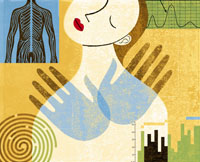Back to: News & Events : Past Meetings and Workshops : Conference on the Biology of Manual Therapies

Agenda--Workshop on the Biology of Manual Therapies
Natcher Conference Center
National Institutes of Health
June 9-10, 2005
Thursday, June 9, 2005
| 7:00-8:00 a.m | Registration and Coffee |
| 8:00 a.m. | Introduction by National Institutes of Health (NIH) and Canadian Institutes of Health Research (CIHR) Staff Dr. Richard Nahin National Center for Complementary and Alternative Medicine (NCCAM), NIH Dr. Juliette "Archie" Cooper Institute of Musculoskeletal Health and Arthritis (IMHA), CIHR Dr. Remi Quirion Institute of Neurosciences, Mental Health and Addiction (INMHA), CIHR Dr. Stephen Straus NCCAM, NIH |
| 8:30 a.m. | Historical Perspective: The Research Status of Spinal Manipulative Therapy (1975) Murray Goldstein, D.O., M.P.H. Medical Director for the United Cerebral Palsy Research and Educational Foundation |
| 9:00 a.m. | Overview: Current Use of Manual Therapies in Canada and U.S. Dr. Michael Smith Health Canada Dr. Maria Verhoef University of Calgary Overview of Manual Therapy Use in Canada Dr. Janet R. Kahn Integrative Consulting Overview of Manual Medicine Use in the U.S. |
| 9:45 a.m. | Break |
| 10:00 a.m. | Session 1: Neuroscience Dr. James Henry (co-chair) McMaster University Dr. Joel Pickar (co-chair) Palmer Center for Chiropractic Research Introduction to Session Session chairs Speakers Dr. Partap S. Khalsa, State University of New York at Stony Brook Mechanical States Encoded by Mechanoreceptors and Mechanonociceptors Dr. Joel Pickar Palmer Center for Chiropractic Research Sensory Input Elicited by Manual Therapies Dr. James Henry McMaster University Spinal Processing of Sensory Inputs: Lessons From Animal Models Dr. Min Zhuo University of Toronto Genetic and Synaptic Studies of Sensory-Related Central Sensitization Dr. Kerstin Uvnas-Moberg Karokinska Institute Antistress Effects in Response to Non-noxious Sensory Stimulation Summary of Recommendations Dr. James Henry Questions from Audience |
| 1:00 p.m. | Lunch |
| 2:00 p.m. | Session 2: Immunology/Endocrinology/Other Dr. Leslie J. Crofford (co-chair) University of Kentucky Dr. Serge Rivest (co-chair) Laval University Introduction to Session Session chairs Speakers Dr. Jon D. Levine University of California, San Francisco Manipulating Pain and Inflammation Dr. Claude H. Côté Universite Laval Biological Mechanisms Underlying the Inflammatory and Healing Phases in Trauma of the Muscle-Tendon Unit: What Have We Learned Recently Dr. Firdaus S. Dhabhar The Ohio State University A Hassle a Day May Keep the Doctor Away: Enhancing Versus Suppressive Effects Of Stress On Immune Function Dr. Dan Clauw University of Michigan Summary of recommendations Session chairs Questions from Audience |
Friday, June 10, 2005
| 7:00 a.m | Coffee |
| 8:00 a.m. | Session 3: Biomechanics and Imaging Dr. John J. Triano (co-chair) Texas Back Institute Linda J. Woodhouse (co-chair) McMaster University Introduction by chairs Linda Woodhouse Biomechanics and Medical Imaging Helping To Unravel Biological Effects of Manual Therapies: An Historical Perspective Speakers Dr. John Triano Manual Therapies: A Biomechanical Continuum Dr. David Wilder Iowa Spine Research Center Timing is Everything in a Column and Segment that Can Buckle Dr. Helene Langevin University of Vermont Connective Tissue Mechanotransduction Responses To Stretch And Acupuncture: From Ex Vivo Fibroblast Cytoskeletal Morphology to In Vivo Ultrasound Elasticity Imaging Dr. Hermano Igo Krebs Massachusetts Institute of Technology Rehabilitation Robotics and Movement Therapy: Implications For Manual Procedures Dr. Norman Kettner Logan College of Chiropractic Functional Neuroimaging Techniques in Manual Therapy Research: Current Status and Future Directions Summary of Recommendations Linda Woodhouse Biomechanics and Medical Imaging: Applying New Strategies for Tough Questions? Questions from Audience |
| 11:00 a.m. | Break |
| 11:15 a.m. | Breakout groups Breakout groups lead by session chairs to discuss research gaps and opportunities. |
| 1:00 p.m. | Lunch |
| 2:00 p.m. | Breakout groups continue |
| 3:00 p.m. | Break |
| 3:30 p.m. | Session chairs report back to main body--Q & A from audience |
| 4:30 p.m. | Closing Comments--NIH and CIHR Staff |
